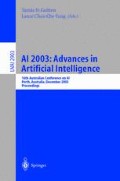Abstract
This research focuses on the knowledge acquisition (KA) for an intelligent tutoring system (ITS). ITSs have been developed to provide considerable flexibility in presentation of learning materials and greater abilities to respond to individual students’ needs. Our system aims to support experts who want to accumulate the classification knowledge. Rule based reasoning has been widely used in ITSs. Knowledge acquisition bottleneck is a major problem in ITSs as it is known in AI area. This problem hinders the diffusion of ITSs. MCRDR is a well known knowledge acquisition methodology and mainly used in classification domain. MCRDR is used to acquire knowledge for the classification of learning materials (objects). The new ITS is used to develop a part of online education system for the people who learn English as a second language. Our experiment results show that the classification of learning materials can be more flexible and can be organized in multiple contexts.
Access this chapter
Tax calculation will be finalised at checkout
Purchases are for personal use only
Preview
Unable to display preview. Download preview PDF.
References
Ainsworth, S., Grimshaw, S., Underwood, J.: Teachers Implementing Pedagogy through REDEEM. Computer and Education 33, 171–187 (1999)
Beck, J., Stern, M., Haugsjaa, E.: Applications of AI in Education
Buchanan, B., Shortliffe, E. (eds.): Rule based Expert System: The MYCIN Experiments of the Stanford Heuristic Programming Project (1984)
Burke, R.: Conceptual Indexing and Active Retrieval of Video for Interactive Learning Environments. Knowledge-Based Systems 9, 491–499 (1996)
Compton, P.J., Jansen, R.: A Philosophical Basis for Knowledge Acquisition. In: 3rd European Knowledge Acquisition for Knowledge-Based Systems Workshop, Paris, p. 75–89 (1989)
Compton, P.: Insight and Knowledge in AAAI Spring Symposium: Cognitive aspects of knowledge acquisition, Stanford University, pp. 57–63 (1992)
Compton, P., Edwards, G., Kang, B., Lazarus, L., Malor, R., Menzies, T., Preston, P., Srinivasan, A., Sammut, C.: Ripple Down Rules: Possibilities and Limitations. In: 6th Bannf AAAI Knowledge Acquisition for Knowledge Based Systems Workshop, Banff (1991)
Compton, P., Kang, B., Preston, P., Mulholland, M.: Knowledge Acquisition without Analysis. Knowledge Acquisition for Knowledge Based Systems. In: Aussenac, N., Boy, G.A., Ganascia, J.-G., Kodratoff, Y., Linster, M., Gaines, B.R. (eds.) EKAW 1993. LNCS, vol. 723, pp. 278–299. Springer, Heidelberg (1993)
Compton, P., Richard, D.: Extending Ripple Down Rules. In: The 4th Australian Knowledge Acquisition Workshop, University of NSW, Sydney, pp. 87–101 (1999)
Kang, B., Compton, P., Preston, P.: Multiple Classification Ripple Down Rules: Evaluation and Possibilities. In: Proceedings of the 9th AAAI-Sponsored Banff Knowledge Acquisition for Knowledge-Based Systems Workshop, Banff, Canada, University of Calgary (1995)
Evens, M.W., Brandle, S., Chang, R., Freedman, R., Glass, M., Lee, Y.H., Shim, L.S., Woo, C.W., Zhang, Y., Zhou, Y., Michael, J.A., Rovick, A.A.: CIRCSIM-Tutor: An Intelligent Tutoring System using Natural Language Dialogue. In: 12th Midwest AI and Cognitive Science Conference, Oxford OH, pp. 16–23 (2001)
Frasson, C., Aimeur, E.: Designing a Multi-Strategic Intelligent Tutoring System for Training in Industry. Computers in Industry 37, 153–167 (1998)
Hayes-Roth, F., Waterman, D.A., Lenat, D.B. (eds.): Building Expert Systems. Addison-Wesley, Reading (1983)
Heffernan, N.T., Koedinger, K.R.: An Intelligent Tutoring System Incorporating a Model of an Experienced Human Tutor
Kim, Y.C., Evens, M.W., Michael, J.A., Trace, D.: Physiology Tutorials Using Casual Concept Mapping. In: 13th Midwest AI and Cognitive Science Conference, Chicago IL, pp. 61–64 (2002)
Kolodner, J.L., Jona, M.Y.: Case-Based Reasoning: An Overview in Technical Report #15 (1991)
Larkin, J., Chabay, R., Sheftic, C. (eds.): Computer-assisted Instruction and Intelligent Tutoring Systems: Establishing Communication and Collaboration, Erlbaum, Hillsdale, NJ (1990)
Nussbaum, M., Rosas, R., Peirano, I., Cardenas, F.: Development of Intelligent Tutoring Systems Using Knowledge Structures. Computer and Education 36, 15–32 (2001)
Polson, M.C., Richardson, J.J. (eds.): Foundations of Intelligent Tutoring Systems, pp. 21–53. Erlbaum, Hillsdale (1988)
Popper, K.: Conjectures and Refutations. Routledge and Kegan Paul, London (1963)
Schank, R.C.: Case-Based Teaching: Four Experiences in Educational Software Design. Interactive Learning Environments 1(4), 231–253 (1990)
Schulze, K.G., Shelby, R.N., Treacy, D.J., Wintersgill, M.C.: Andes: A Coached Learning Environment for Classical Newtonian Physics. In: 11th International Conference on College Teaching and Learning
Slade, S.: Cased-Based Reasoning: A Research Paradigm. AI Magazine 12(1), 42 (1991)
Sokolnicki, T.: Towards Knowledge-Based Tutors: a Survey and Appraisal of Intelligent Tutoring Systems. The Knowledge Engineering Review 6(2), 59–95 (1991)
Zhou, Y., Freedman, R., Glass, M.: Delivering Hints in a Dialog-Based Intelligent Tutoring System. In: Proceedings of 16th National Conference on Artificial Intelligence (AAAI 1999), Orlando (1999)
Woolf, B.: Theoretical Frontiers in Building a Machine Tutor. In: Kearsley, G. (ed.) Artificial Intelligence and Instruction-Applications and methods, Addison-Wesley, Reading (1987)
Author information
Authors and Affiliations
Editor information
Editors and Affiliations
Rights and permissions
Copyright information
© 2003 Springer-Verlag Berlin Heidelberg
About this paper
Cite this paper
Kim, Y.S., Park, S.S., Kang, B.H., Lim, J.S. (2003). Using Multiple Classification Ripple Down Rules for Intelligent Tutoring System’s Knowledge Acquisition. In: Gedeon, T.(.D., Fung, L.C.C. (eds) AI 2003: Advances in Artificial Intelligence. AI 2003. Lecture Notes in Computer Science(), vol 2903. Springer, Berlin, Heidelberg. https://doi.org/10.1007/978-3-540-24581-0_43
Download citation
DOI: https://doi.org/10.1007/978-3-540-24581-0_43
Publisher Name: Springer, Berlin, Heidelberg
Print ISBN: 978-3-540-20646-0
Online ISBN: 978-3-540-24581-0
eBook Packages: Springer Book Archive

